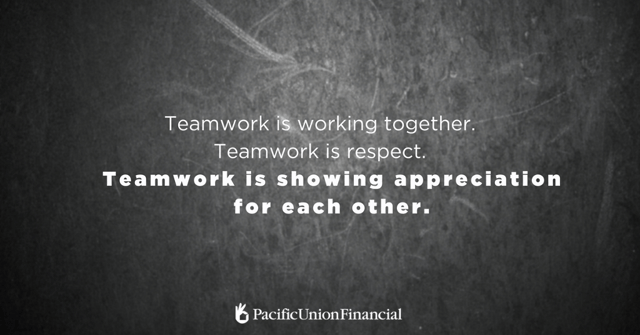People use the term "Teamwork" all the time, but what does it mean?
I saw this posted on LinkedIn (thanks Pacific Union Financial):

More places - and people - need to consider this. Don't claim to be a "team player" if you don't show respect and/or you refuse to work together.
What does 'working together' mean?
I suggest to you that, at it's heart, it means to be aware and to help one another! Is a co-worker under pressure? Ask if you can help with some part of the project. Don't wait for a manager to assign it to you. Volunteer! Be attentive to how others are feeling or acting. If you hear a tone in their voice, try to find out what's generating it. Don't assume it's a failure on their part, or that it's something you did. Don't condemn them for being human and sometimes being overwhelmed.
Be aware. Be helpful. Be humble.
Rather, try talking to your co-worker. Try to find out what's going on and how you can help, even if it's just a listening ear. Checking in with them may do more to diffuse a potentially bad situation than complaining behind their backs.
Being part of a team is about helping one another grow. It means not leaving issues to the manager, or having unrealistic expectations about anyone on the team. If asked for feedback, give it - you were offered your chance! If you need to give feedback that wasn't solicited, try to ease into it with caring and respect. Depending what is the source of the other person's stress or behavior, the person may or may not respond positively. But likely, they will reflect on what you shared, and either take steps to change or they might find someone else to discuss it with for additional insight.
Another possibility is that you may learn that you are the one who, in fact, needs to change. In many cases, it's someone's insecurity or selfishness that was assigning a negative motive, and assuming someone else's words or actions was in reference to them, when it had nothing to do with them...and in fact, yours was the behavior at fault, not the other person's.
If you assume the best about someone, that's what you'll usually experience. If you assume the worst, that's what you'll usually experience.
While you're at it, remember that it's not just managers who should say "please" and "thank you," but also everyone on the team to one another (that includes to your boss). Creating a team environment that calls forth the best in each person and allows each person to flourish takes the efforts of all members of the team.

